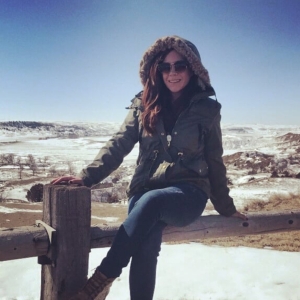Meet Simone Webster, MSW ‘18, Who is Transforming the Lives of South Dakota’s Native American Youth
September 20, 2018- Alumni
Simone Webster, MSW ‘18, is leveraging her social work skills and her passion for indigenous cultures to provide mental health care to South Dakota’s Lakota Sioux youth population.
“When I began my MSW, I didn’t have any experience working on the ground with vulnerable populations,” said Simone Webster, MSW ‘18. “Because I was used to approaching issues from a research standpoint, I struggled to see myself as a social worker.”
But that all changed once Webster took part in a USC Suzanne Dworak-Peck School of Social Work spring break immersion trip to a Native American reservation in South Dakota, where she was able to combine her background in research with an interest in directly serving historically underserved Native populations.
Her experience in this area started in her undergraduate years. After receiving a bachelor’s degree in religious studies with an emphasis in indigenous cultures from the University of California at Santa Barbara, Webster joined the Navajo Nation Historic Preservation Department in Arizona, where she catalogued archaeological artifacts. During her time there, she encountered the Native people who called the land home, and wished she could do more to alleviate their enduring struggles with poverty and restricted access to mental health resources. “I wanted to be on the ground developing solutions for indigenous people,” she said.
Her drive led her to pursue an MSW at the USC Suzanne Dworak-Peck School of Social Work, which she completed in the spring of this year. Since receiving her degree, Webster has applied her background in indigenous cultural studies and social work to a larger goal: increasing the accessibility of mental health care services for youth members of the Lakota Sioux tribe in South Dakota.
Encountering South Dakota’s Lakota Sioux Population
Last spring, Webster had her first opportunity to apply her clinical skills during the weeklong USC-led immersion trip to the Cheyenne River Reservation in South Dakota. This reservation is home to some 8,000 Native American Lakota Sioux people organized into 13 smaller communities. Most of the reservation’s inhabitants live without proper water or sewage systems and survive on less than one-third of the average American income.
During the immersion trip, Webster traveled around the reservation, met with members of the Lakota community, and attended talks on spirituality and community given by elder tribe members.
“Before this experience,” she said, “I had thought of my two areas of expertise—religion and social work—as dualistic and exclusionary. For the first time, I learned how they could work in harmony with one another. At the same time, the experience provided insight in to how to integrate the principles of social work into grassroots community work.”
A Passion for Working with Youth
Empowered by the lessons she learned during the immersion trip, Webster accepted a field placement at the YMCA Camp Marrowbone, a summer camp for Native youth whose mission is “to teach life skills through the character traits of caring, honesty, respect, responsibility and traditional Lakota values.” Here, Webster facilitated team-building activities, taught mindfulness practices and educated the camp staff on the principles of trauma-informed care to better meet the needs of campers who had endured challenges, including poverty, family instability and mental health issues.
“My placement experience at Camp Marrowbone was different than those I’d had in office settings because there was no expectation of adhering strictly to a schedule,” she said. “I learned how to be fluid—it’s the Lakota way.” Her experiences with the youth of Camp Marrowbone ignited her passion for serving young people, and acted as the driving force behind her next professional endeavor.
Developing a Sense of Mutual Respect
Today, Webster doesn’t just work with youth from the Cheyenne River Reservation, but with Native American youth ages 10 to 17 from reservations across South Dakota. As a staff member at a Sioux Falls Lutheran Social Services center—which is divided into a juvenile detention facility and a transitional program for youth with severe mental health issues—she describes her role as “a 24/7 counselor.”
“A lot of what I do is simply being available—there are no formal appointments or scheduling procedures,” Webster said. Instead, she acts as a full resource for these youth, who approach her on their own terms to discuss their feelings and experiences. She helps them understand why they might be feeling stressed, anxious or depressed, and works with them to develop healthy coping behaviors.
“If they want to color, I color with them; if they want to write in a journal, I support them in developing that routine,” Webster said. “Each young person has different needs—it’s my job to figure out solutions that work best for them.”
Though the work poses new challenges each day—from picking lice out of hair to learning to react quickly and effectively when youth become physically aggressive—Webster has found the work deeply rewarding. “When you share a space with young people, you gain their perspective and develop a sense of mutual respect,” she said.
Mobilizing Her Future
Webster plans to continue developing her social work skills by working with indigenous youth. “Eventually,” she said, “I would love to open my own mobile private practice.” She dreams of housing a private practice inside an RV that she can drive across South Dakota, bringing affordable mental health care to indigenous people across a number of reservations.
“The Lakota people have invited me into their home—all I can hope to do is give back and help make the community a better place,” she said.
To reference the work of our faculty online, we ask that you directly quote their work where possible and attribute it to "FACULTY NAME, a professor in the USC Suzanne Dworak-Peck School of Social Work” (LINK: https://dworakpeck.usc.edu)
